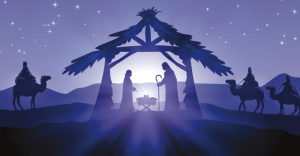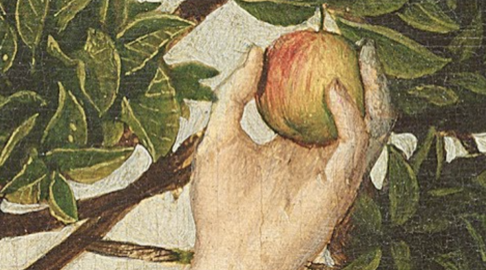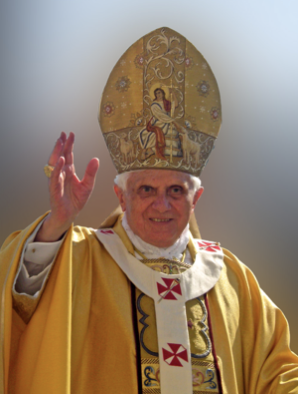
St Mark in his Gospel passes over the birth of the baby Jesus. St Mark simply kicks off his Gospel with the summation – “Jesus Christ, the Son of God”. On the other hand, St Luke from the perspective of Mary, and St Matthew from the perspective of St Joseph, provide detailed accounts of the birth of Jesus.
EAGLE-EYED
St John, writing many years later, takes a different tack, an eagle-eyed view, providing further and better particulars of St Mark’s pithy summation:

In the beginning was the Word, and the Word was with God, and the Word was God. He was in the beginning with God; all things were made through him, and without him was not anything made that was made. In him was life, and the life was the light of men. The light shines in the darkness, and the darkness has not overcome it.
CREATION
St John sees Jesus of Nazareth in the context of the beginning, of Creation. Genesis provides two Creation accounts. In the Bible there are many different perspectives. God who is Truth, is not exhausted by one perspective. The first Creation account relates God “said” as each element of heaven and earth is created. The Word is present in the beginning. In the first Genesis account Creation brings light, order and goodness into the chaos which was before. The Word, by His life, death and resurrection, gives rise to a new beginning, again bringing light, order and goodness into the chaos of the world wrecked by Original Sin. The Word, Jesus of Nazareth, brings to be a new Creation. So, Jesus is the beginning of history, the centre of history, just as He is the end of history.

BEGINNING
At the very beginning, the Spirit of God was moving over the face of the waters. Not without significance, the ancient writer recounts God as saying: “Let us make man in our own image, after our own likeness.” So, at the beginning we have the three Persons of the Trinity – Father, Son and Holy Spirit, just as in St John’s Gospel we also have the Trinity. The Genesis accounts of Creation relate the beginning of all living things, the beginning of human life, including work, which takes six days, and involves rest on the seventh day; the beginnings of human society which arises in the relation of man and woman, a bodily relation, involving openness to new life, and mutual help. So, the Genesis accounts of Creation introduce us to human solidarity which we experience in the mutual love of our parents.
FALL
The Genesis account of the Fall involves both seeking sensual pleasure (the fruit of the tree), and also pride (rejection of God’s plan for us). God asks as he walks in the garden in the cool of the day, “Where are you?”. Our First Parents have become lost, by reason of this first sin, Original Sin. In another garden, that of Gethsemane, Jesus of Nazareth, will pray “Not my will, but Thine be done.”
PEACE
Original Sin brings a never-ending conflict between good and evil: disharmony between spouses; disharmony between brothers (Cain and Abel); disharmony with the world of nature which transforms work into toil; disharmony within man himself which brings sickness and death; disharmony with God. In contrast to the disharmony wrought by Original Sin, Jesus of Nazareth, after his Resurrection, greets his disciples, “Peace be with you”.
EFFECTS OF FALL
After Genesis 3, the remainder of the Hebrew Bible is an explication of the effects of the Fall. Human life, life among the Jews (even the greatest of Jewish leaders, King David) is blighted. How can the author of so many of the Psalms be the same person who engaged in the sordid adulterous affair with Bathsheba, who connived at the murder of her husband Uriah the Hittite?
The Gospel accounts of Jesus of Nazareth, the Word who is God, especially the Gospel of St John are to be read in the context of the two Genesis accounts of Creation, and the account of the Fall.
BROADER CONTEXT
So, St John provides a broader context within which to understand the birth of the baby Jesus in Bethlehem. To my mind, St John, writing in the last years of his life, read the nativity accounts of St Matthew and St Luke, saw what was yet to be said, and said it, providing a transcendent theological understanding of the significance of the birth of the baby Jesus. Thus the association of St John the theologian with the eagle is justified by the early verses of his Gospel.

POPE BENEDICT XVI
Joseph Ratzinger/Pope Benedict XVI understood that St John, while providing no precise account of the birth of Jesus of Nazareth, does provide an account of Jesus, of where he comes from:
The man Jesus is the dwelling-place of the Word, the eternal divine Word, in this world. Jesus’ ‘flesh’, his human existence, is the ‘dwelling’ or ‘tent’ of the Word: the reference to the sacred tent of Israel in the wilderness is unmistakable. Jesus is, so to speak, the tent of meeting – he is the reality for which the tent and the later Temple could only serve as signs. Jesus’ origin, his provenance, is the ‘true ‘beginning’ – the primordial source from which all things come, the ‘light’ which makes the world into the cosmos. He comes from God. He is God. This ‘beginning’ that has come to us opens up – as a beginning – a new manner of human existence.
St Matthew and St Luke’s account of the origin of Jesus of Nazareth provides material for sound popular piety, based on historical events surrounding Jesus’ birth. St John’s account of the origin of Jesus of Nazareth provides a broader theological perspective without which Jesus of Nazareth remains, to some extent, a stranger.
On behalf of the Council of the Society, I wish you and your family a happy and holy Christmas.
Michael McAuley
17 December 2021
